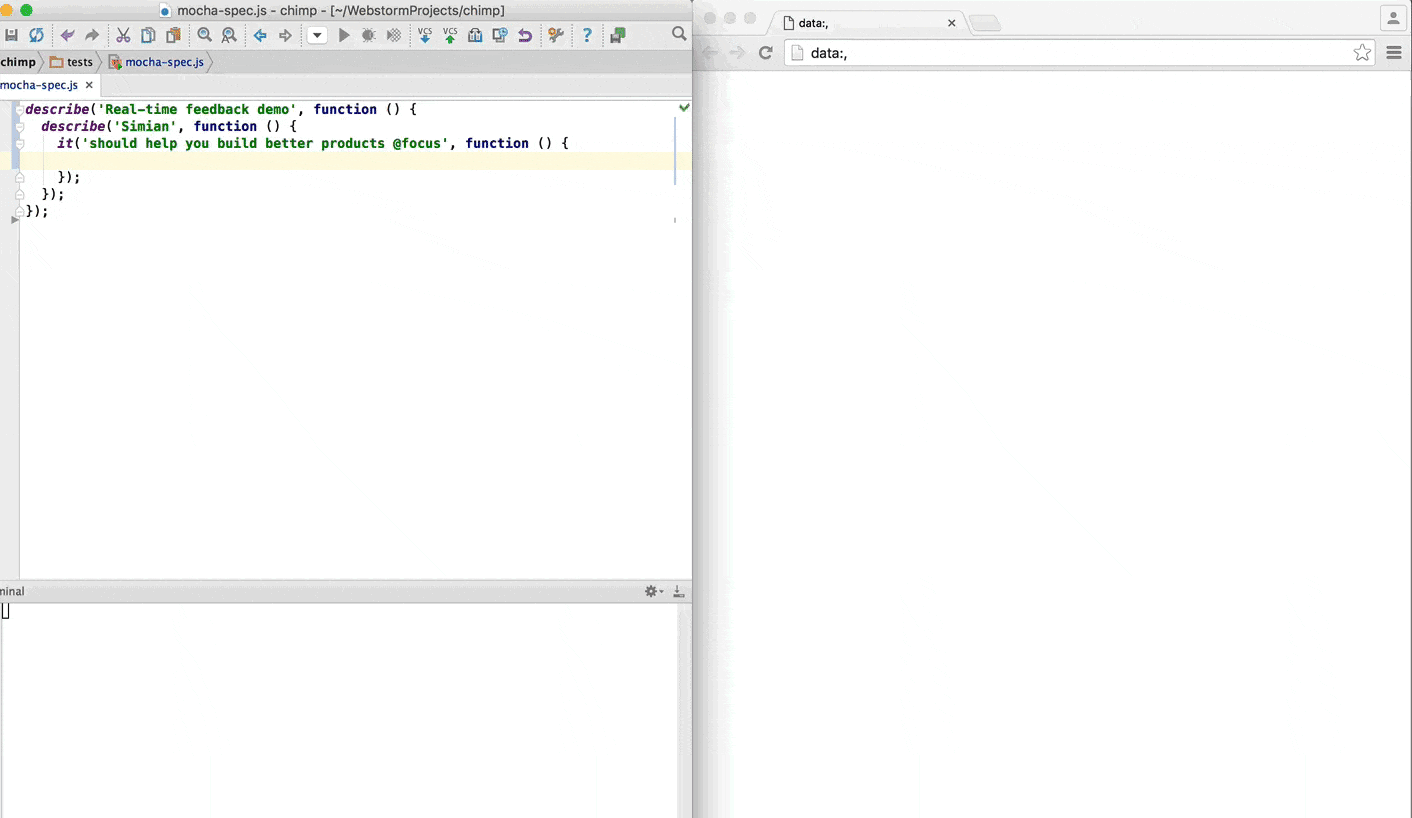An awesome developer-centric experience to writing tests with realtime feedback using Mocha, Jasmine or Cucumber.js.
Chimp can be used with any technology stack as it allows your to write your test automation in the language of the web: JavaScript.
Traditionally only available for unit testing, and now you can get super fast feedback for your acceptance and end-to-end tests:
Set an @focus tag in the spec title, save a file, Chimp reruns the spec until you make it pass.
Checkout our new book where you can learn how to use Chimp across the Full Stack from React to Node.JS, Mocha, Meteor and more.
Quality Faster by Sam Hatoum, creator of Chimp.
npm install -g chimpBe sure to checkout our Automated Testing Best Practices repository.
Having trouble? See the installation documentation.
For development mode, you can use the watch mode:
chimp --watchYou can also easily change the browser Chimp with --browser, e.g. --browser=phantomjs
npm install chimplet Chimp = require('chimp');
let options = require('./my/config/for/chimp');
options['_'] = [
'/my/path/to/node',
'/my/path/to/my/project/node_modules/.bin/chimp.js'
];
let chimp = new Chimp(options);
chimp.run(function (err, res) {
console.log('CHIMP RES:',res);
console.log('CHIMP ERR:',err);
//next action after chimp finish
});Read the full documentation site.
(Thank you to Readme.io for the OSS <3)
We chose WebdriverIO for it's awesome API and made it awesomer by converting it to a synchronous syntax:
browser.url('http://google.com'); // SETUP
var title = browser.getTitle(); // EXECUTE
expect(title).to.equal('Google'); // VERIFYNo callback-hell or confusing assertions with promises, just easy-to-read synchronous code that works as you expect it to.
Chimp is tested on all the popular CI servers. We genuinely just want you to focus on writing tests and let us deal with all the boring bits!
Some developers love Jasmine and Mocha, and some teams love to use Cucumber for BDD. We decided to give you the choice between the best in class test frameworks for writing end-to-end and acceptance tests.
End-to-end and acceptance testing often require you to setup data on the server and reset state between specs.
Chimp exposes a global function called request that is a synchronous version of the popular request module. Our synchronous version of the request module allows you to call your server to reset your system or setup data and receive a result back synchronously, like this:
var userId = request({
url: 'http://localhost:3000/fixtures/createUser'
method: 'POST',
json: true,
body: {username: 'Bob', password: 't0ps3cret'}
});Or if you are using Meteor, you can get fancy with our server.execute method:
var privateSetting = server.execute(function(settingKey) {
return Meteor.settings[settingKey];
}, 'privateSetting')Chimp is PACKED with features that make your life easier. See the documentation site for more details.
Chimp comes with first-grade Meteor support out-of-the-box, including hot-deploy detection that runs specs after your Meteor client or server restart.
Be sure to checkout our Automated Testing Best Practices repository which is written using Meteor.
In development mode, use the watch mode:
# start your Meteor app first
chimp --watch --ddp=http://localhost:3000On CI, can select the browser:
# start your Meteor app first
chimp --browser=firefox --ddp=http://localhost:3000If you'd like to run a test with more than one Meteor app server, you can do so by running the same app on multiple ports and providing mulitple -ddp options to chimp:
# start first app
meteor --port 3005
# start second app in another shell
meteor --port 3007
# run chimp in another shell
chimp --watch --ddp=http://localhost:3005 --ddp=http://localhost:3007
Then you can access the servers in your tests on the global server.instances property
it('has PORT env var set', function() {
function getRootUrl() {
return process.env.ROOT_URL;
}
expect(server.instances[0].execute(getRootUrl)).to.equal('http://localhost:3005/');
expect(server.instances[1].execute(getRootUrl)).to.equal('http://localhost:3007/');
});
Support us with a monthly donation and help us continue our activities. [Become a backer]
Slack: Join our Slack xolv.io/community #chimp channel, where you can find help and help others.
Gitter: https://gitter.im/xolvio/chimp
Become a sponsor and get your logo on our README on Github with a link to your site. [Become a sponsor]







